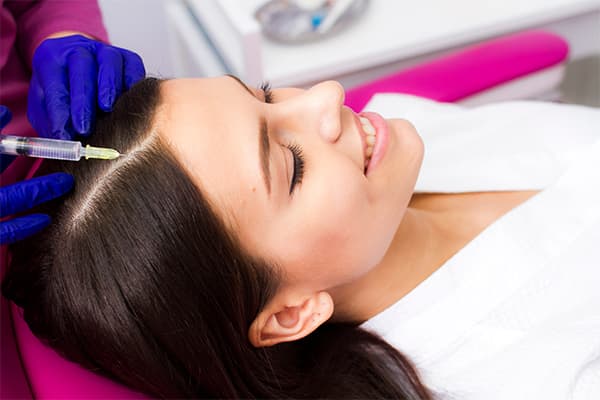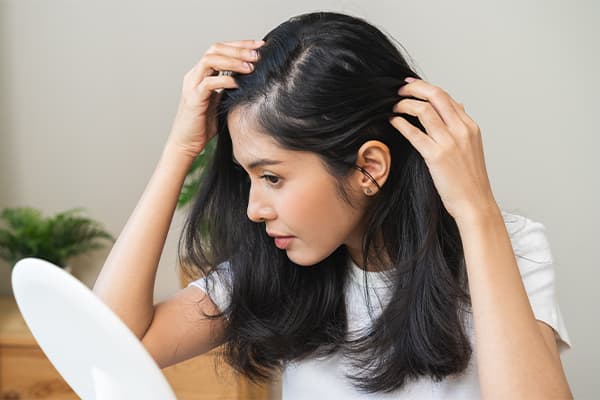Top 12 Ways To Prevent Hair Thinning In 2024
Aditi Patel
Best Hair Aware Editor
According to the American Academy of Dermatology, it’s normal to lose 50 to100 hair strands per day. Losing more than this could indicate excessive shedding, which may contribute to overall thinning hair. Unlike widespread hair loss, thinning hair doesn’t usually lead to baldness but can create the appearance of sparse patches on the scalp. Thinning hair tends to occur gradually, giving you time to identify the causes and explore the most effective treatment options.

What Are the Causes of Thinning Hair?
Thinning hair can be triggered by a blend of genetics, lifestyle habits, and certain medical conditions. Lifestyle factors that contribute to thinning hair include overtreating the hair with color treatments, relaxers, and perms, as well as using harsh products like strong-hold hair sprays and gels. Tight hairstyles, such as ponytails or updos, can stress the hair follicles and cause breakage over time.
A lack of essential nutrients like iron and folic acid, which are necessary for healthy hair growth, can also lead to thinning. Additionally, chronic stress can increase cortisol levels, triggering conditions like telogen effluvium, where hair falls out and follicles enter a resting phase, preventing new growth.
Thinning hair can also be hereditary or caused by underlying medical conditions. It may occur if you’ve recently had a baby, stopped taking birth control pills, or are experiencing hormonal changes. Other causes include rapid weight loss, treatment for an autoimmune disease, immune system deficiencies, skin disorders or infections, and vitamin D deficiency. Deficiencies in other vitamins and minerals, such as selenium, riboflavin, and zinc, can also contribute. Less common causes may be linked to habits like pulling at your hair, eating disorders, or having a high fever.
Effective Treatments and Home Remedies for Hair Thinning
Some cases of thinning hair can be treated at home with various methods, though it’s important to consult with your doctor first.
-
- Scalp massages: One such option is scalp massage, which is both affordable and accessible. While it doesn’t address thinning hair caused by underlying medical conditions, scalp massage can help stimulate blood flow to the hair follicles. To do this, gently apply pressure with your fingertips around the scalp while washing your hair. For added benefits, you can use a handheld scalp massager to also help remove dead skin cells.
- Anti-Thinning Shampoo: Anti-thinning shampoos mainly work in two ways. They provide volume, making hair appear thicker, which is especially helpful for those with thinning or naturally fine hair. These shampoos also contain vitamins and amino acids that support a healthier scalp and promote hair growth. For best results, it’s vital to follow the instructions provided with the product. Additionally, you can consult your doctor about prescription-strength shampoos, with companies like Keeps and Happy Head offering these prescriptions online.
- Essential Oils: Essential oils, which are extracted from plants, are commonly used in aromatherapy and alternative medicine. Lavender oil, in particular, has shown some promise in helping with pattern baldness, with animal studies from 2016 supporting its potential benefits. However, more human research is needed to confirm its effectiveness. Lavender oil is often mixed with other oils, such as rosemary and thyme. Despite its popularity, there is insufficient evidence to prove that essential oils can effectively treat baldness or thinning hair. If you decide to try this treatment, ensure the essential oil is diluted in a carrier oil, such as coconut or jojoba oil. Always perform a patch test by applying a small amount to your arm and waiting 24 hours for any signs of irritation, such as redness, rash, or hives, which could indicate an allergic reaction.
- Multivitamins: Healthy hair is closely linked to overall good health, and malnutrition or certain eating disorders can prevent new hair from growing. A blood test can help identify any nutrient deficiencies. If you’re lacking in key nutrients, your doctor may recommend a daily multivitamin. Essential nutrients for healthy hair growth include iron, folic acid, and zinc. Look for multivitamins or supplements that meet these needs, such as OLLY Heavenly Hair Gummies or HUM Hair Strong Gummies. However, avoid taking extra vitamins if you’re already meeting your nutritional needs, as there is no evidence that excessive supplementation can reverse thinning hair, and too much of certain nutrients could potentially cause harm.
- Biotin: Biotin, also known as vitamin B7, is found naturally in foods like nuts, lentils, and liver, and deficiencies are rare if you eat a balanced diet. Despite this, biotin supplements have gained popularity, with products like Hims Biotin Gummies marketed for better hair growth and increased energy. While biotin supports enzyme breakdown in the body, there is limited evidence to suggest it can prevent thinning hair. Additionally, biotin should not be taken with vitamin B5 supplements, as they can reduce each other’s effectiveness when used together.
- Folic acid: Folic acid, a type of vitamin B, plays a key role in cell generation, and some studies suggest that a deficiency in folate may be linked to certain types of hair loss. However, there isn’t enough evidence to confirm that folic acid can directly make hair thicker.
- Fatty Acids: Omega-3 and Omega- 6 fatty acids are essential fats that the body cannot produce on its own. Omega-3 helps fight inflammation, which is linked to various health conditions, including premature hair loss. Omega-6 is important for maintaining overall skin health, potentially benefiting the scalp. While omega-6 is primarily found in plant-based oils, omega-3 fatty acids are abundant in fish and some seeds. If your diet lacks these foods, consider discussing supplements with your doctor.
- Finasteride: Finasteride (Propecia) is a prescription medication for hair loss, available as a daily pill for men. Unlike topical treatments like minoxidil, Propecia works systemically to reduce hair loss. Prescriptions can be obtained online through companies such as Roman, Hims, and Keeps. However, women planning to become pregnant, are pregnant, or of childbearing age should avoid this medication due to potentially serious side effects seen during pregnancy. For postmenopausal women, studies suggest that finasteride can be an effective treatment and is often prescribed by healthcare providers.
- Minoxidil: Minoxidil, commonly known by the brand name Rogaine, is an FDA-approved over-the-counter treatment for hair loss. It is available online through companies like Hims and Keeps as well. With direct application to the scalp twice a day, minoxidil can help thicken hair in areas experiencing balding. It comes in both liquid and foam versions so you can choose based on your preference. A prescription version is also available from your doctor. Visible results from Rogaine may take up to 16 weeks, and consistent use is crucial for effectiveness. Possible side effects include scalp irritation and unwanted facial or neck hair growth.
- Spironolactone: Spironolactone (Aldactone) is a medication that may be prescribed for individuals with thinning hair caused by hyperaldosteronism, or excess aldosterone production. Although it is primarily a diuretic, often used to treat high blood pressure or fluid retention (edema), Aldactone also acts as an anti-androgen. In women, it can aid address hair thinning and hair loss linked to hormonal imbalances or fluctuations.
- Corticosteroids: Corticosteroids are prescription medications used to treat conditions associated with inflammation, which can sometimes lead to hair loss. One such condition is alopecia areata, an autoimmune disorder where the immune system attacks hair follicles, resulting in thinning or sudden hair loss. The extent of hair loss can vary from mild or patchy to more significant. In these cases, prescription corticosteroids can help reduce inflammation directly at the hair follicles. Depending on the severity of the hair loss, corticosteroids may be applied topically or injected into the scalp by a dermatologist every 4 to 8 weeks.
- Laser Therapy: Laser therapy is commonly administered by dermatologists and skin specialists, but some FDA-approved devices are now available for home use. At-home laser therapy is designed to stimulate hair regrowth and increase hair thickness, although it can take several months to see noticeable results. One of the main downsides of at-home laser therapy is the cost, as some devices can be quite expensive and may not yield the desired outcomes. It’s important to consult with your doctor before making a significant financial investment in these treatments.
How Can I Slow Down or Reverse Hair Thinning?
If your hair loss is caused by an underlying medical condition like alopecia areata, receiving the appropriate treatment from your doctor can help manage the condition. However, if your doctor determines that your hair loss is not related to a medical issue, there are still preventive measures you can take to reduce the risk of further hair loss. Consider these steps:
Maintain a Balanced Diet
Hair loss can sometimes be linked to deficiencies in micronutrients, like iron, or macronutrients such as protein. If you’re unsure about your diet, it might be helpful to consult with a doctor or dietitian for meal planning advice. Additionally, before starting any new supplements, particularly multivitamins or those containing fat-soluble vitamins, it’s important to discuss them with your doctor to ensure they’re appropriate for your needs.
Consider Quitting Smoking to Protect Your Hair
Smoking, which is known for its harmful effects on the body, can also contribute to hair loss. Its inflammatory impact on the body may disrupt the hair growth cycle and potentially lead to hair thinning and loss of color.
Manage Stress to Help Prevent Hair Thinning
Long-term stress can have a similar effect on your hair. Chronic stress raises levels of cortisol, a hormone that can interfere with the hair growth process. To manage stress, it’s helpful to engage in activities that promote relaxation, such as meditation or hobbies you enjoy. If stress becomes overwhelming, seeking support from a therapist can also be beneficial.
Proper Hair Care
While reversing thinning hair is important, it’s equally essential to maintain good hair care practices. Opt for gentle hair products when possible, and avoid excessive combing or brushing. To minimize stress on your hair, limit the use of heated styling tools and avoid tight hairstyles that can cause tension on your hair follicles.
When Should You Consult a Doctor About Thinning Hair?
While it’s normal to lose some hair throughout the day, it’s important to consult your doctor if you’re losing more than 100 hairs daily. You should also seek medical advice if you’re concerned about ongoing hair loss, a receding hairline, or notice sudden patchy hair loss, as these could indicate an underlying health condition.
Conclusion
Although thinning hair can be worrying, many forms of hair loss are treatable. If you’re noticing new hair thinning, hair loss, or bald spots, it’s important to consult with a doctor. They can help identify any underlying medical issues and suggest appropriate treatments or medications. For more advanced cases of alopecia, hair transplants may also be a viable option.








